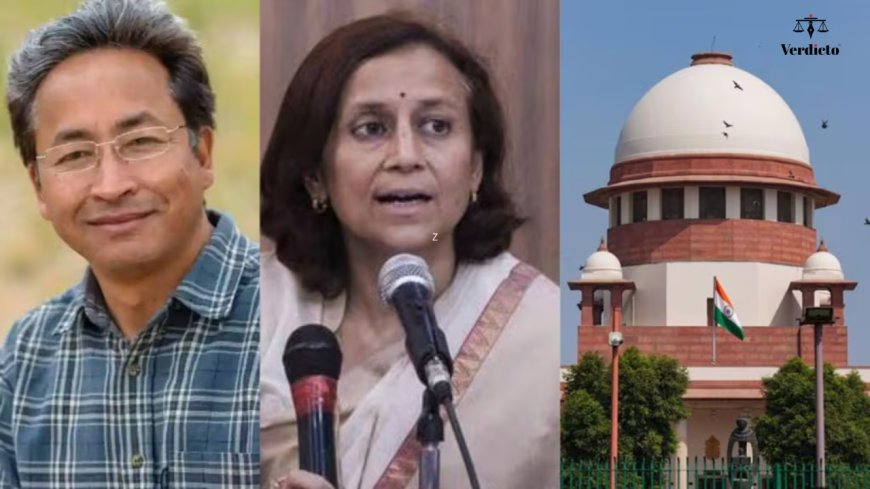Supreme Court to Hear Plea Against Sonam Wangchuk’s Detention Under NSA
Sonam Wangchuk, held under the NSA, approaches the Supreme Court. Explore the full story to learn the constitutional debates and preventive detention law ahead of the October 6 hearing.

The Supreme Court of India will on October 6 hear a habeas corpus petition filed by Gitanjali J. Angmo, wife of renowned climate activist Sonam Wangchuk, challenging his detention under the National Security Act (NSA).
As per the top court’s cause list, the matter is scheduled before a bench of Justices Aravind Kumar and N.V. Anjaria. The petition, filed on October 2, seeks immediate release of Wangchuk and questions the legality and transparency of his detention.
Background: Ladakh Protests and the NSA Action
Wangchuk was detained on September 26 under the NSA, a preventive detention law that empowers authorities to hold individuals without trial for up to 12 months if deemed a threat to public order or national security.
His detention followed the violent protests in Ladakh on September 24, which left four people dead and nearly 90 injured after police firing. The protests erupted over demands for statehood for Ladakh and its inclusion under the Sixth Schedule of the Constitution, which ensures autonomy and protection for tribal regions.
Read more: Ladakh Unrest: Leh Protests Over Statehood and Sixth Schedule Turn Deadly
Authorities allege that Wangchuk played a key role in “instigating” the protests, though his supporters claim the movement was peaceful and democratic. He was reportedly shifted to Jodhpur following his detention.
Angmo’s Plea: “No Information About His Health or Grounds of Detention”
In her petition, Gitanjali Angmo stated:
“I have sought relief from the Supreme Court of India through a Habeas Corpus petition against Wangchuk’s detention. It is one week today. Still, I have no information about Sonam Wangchuk’s health, the condition he is in, nor the grounds of detention.”
Angmo has urged the Supreme Court to intervene urgently, arguing that her husband’s detention violates his fundamental rights under Articles 21 and 22 of the Constitution, which guarantee personal liberty and protection against arbitrary detention.
Legal Context: What the NSA Allows
The National Security Act, 1980, permits preventive detention of individuals to maintain public order or safeguard national security. However, it has often been criticized by civil rights advocates for being used as a tool to suppress dissent.
Under the NSA:
-
A person can be detained for up to 12 months without formal charges or trial.
-
The grounds of detention can be withheld if authorities consider disclosure to be against “public interest.”
-
The Advisory Board, comprising High Court judges, reviews each detention but cannot disclose its findings publicly unless detention is found unjustified.
Legal experts note that the NSA’s broad powers often lead to tension between state security and individual liberty, especially when used against activists or political leaders.
The Broader Debate: Ladakh’s Political Demands
The protests in Ladakh have been building over long-standing demands for statehood and inclusion under the Sixth Schedule, which would grant local communities more control over land, resources, and governance.
Since the revocation of Article 370 in 2019 and Ladakh’s bifurcation from Jammu and Kashmir, residents have voiced concerns over loss of political representation and environmental degradation caused by unregulated development.
Wangchuk, known globally for his climate activism and sustainable engineering, has been a leading voice advocating for Ladakh’s ecological and cultural protection. His detention has sparked nationwide debate over the limits of dissent in a democracy and the use of preventive detention laws against activists.
What’s Next
The Supreme Court’s hearing on October 6 will be crucial in determining whether the detention stands on legal and constitutional grounds. The case could also set a precedent for future preventive detentions under the NSA involving activists and civil society leaders.
Verdicto will continue to follow the hearing and provide legal analysis and updates on the court proceedings.
Verdicto Explainer: Habeas Corpus
Habeas Corpus, Latin for “you may have the body,” is a fundamental constitutional remedy under Article 32 and Article 226, enabling courts to demand that a detained person be presented before them.
It serves as a safeguard against unlawful detention and is one of the strongest legal tools to protect personal liberty in India.
📌 Follow us on YouTube, Instagram, and Twitter for more updates.







